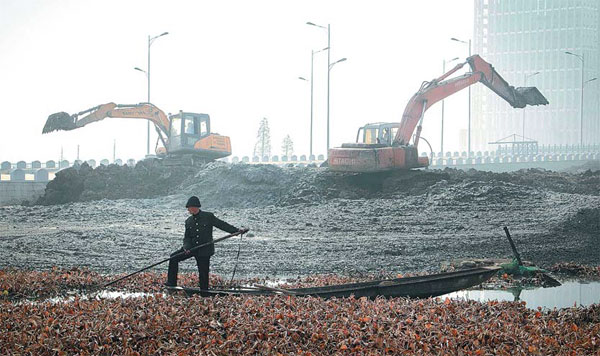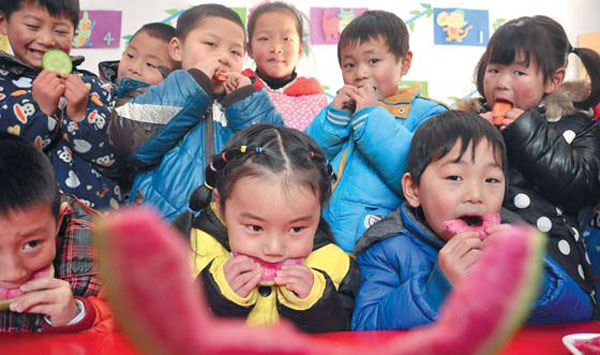What's news

| A villager fishing in the waters of a wetland in Shaoxing, Zhejiang province, late last month. The area is being filled in to make way for new buildings. Photos provided to China Daily |
Slovakia seeks greater use of China rail link
Slovakia wants to make greater use of the Yuxinou Railway, a key artery linking China and Europe, according to Miroslav Lajcak, the foreign minister as well as deputy prime minister of the East European country, who spoke during a visit to China.
After speaking on Feb 3 on cooperation between China and Central Europe at the Chinese Academy of Social Sciences, Lajcak told China Daily that the railway is "essential" for the development of countries along it, and his country is studying how to use the railway more efficiently.
The freight rail route links the southwestern Chinese city of Chongqing with Duisburg, Germany after traveling through Central Asia and Eastern Europe.
Slovakia also hopes for greater collaboration with China in high-speed railways and other high-tech areas, Lajcak said.
China to strengthen marketing of GM foods
China's genetically modified food market will not be dominated by foreign products, a senior rural affairs official said on Feb 3 amid calls by authorities for intensified efforts to ease public fears over GM products.
The country will continue to support GM food research as a nation with a massive population to feed, the official said, hinting that it will support the commercialization of domestic GM products.
Han Jun, deputy director of the Office of the Central Rural Work Leading Group, China's top rural affairs decision-making agency, said "there is one point we are clear on: We cannot allow China's GM food market to be dominated by foreign products".
China has yet to approve of marketing campaigns for GM grains. To date, agricultural authorities have only approved the marketing of domestic GM papaya and cotton, Han said.
Meanwhile, imported GM soybeans, corn, cotton and rapeseed have taken up a major portion of the country's agricultural market. China imported 71 million metric tons of soybeans last year, a majority of which were GM soybeans, Han said.
Drones taking to the air to test delivery services
Some online shoppers in China will have to look to the skies for their packages on Feb 4.
Using five drones, a Chinese express company is partnering with e-commerce giant Alibaba's retail site to launch the first public air delivery campaign in China.
The country's answer to Amazon CEO Jeff Bezos' airborne robot home delivery plan has triggered debate over whether the futuristic technology will solve problems or be a hindrance.
Shanghai YTO Express (Logistics) Co said that it will deliver online orders from China's largest customer-to-customer shopping site Taobao.com using drones near a number of distribution sites in Beijing, Shanghai and Guangzhou, Guangdong province.
Packages will be delivered within one hour of Taobao receiving online orders, YTO Express said.
Conditions for the three-day test include: Buyers must be within a certain radius and each drone will only carry products weighing less than 340 grams for every delivery, and buyers must also order a designated brand of ginger tea online.
New law holding officials more accountable
The Beijing High People's Court said on Feb 3 that officials' attendance record at court hearings has reached an average of 99 percent, according to records of civil cases involving government-related litigation.
Recent amendments to civil procedure law stipulate that government organizations have an obligation to send officials to hearings rather than simply authorizing lawyers to act on their behalf.
As the new law comes into effect in May, both department heads and lower-level officials will face the prospect of judicial punishment if they fail to show up in court.
In 118 lawsuits involving Pinggu district government departments in Beijing over the past three years, department heads were present in more than 60 percent of the court hearings.
New regional system set up with Russia, India
China, Russia and India agreed on a consultation mechanism for Asia-Pacific affairs on Feb 2, with their foreign ministers calling for the first round of talks on the mechanism to be held soon.
The joint declaration, which came after a three-way meeting in Beijing, followed US President Barack Obama's high-profile visit to India last week.
In a rare meeting with a visiting Indian foreign minister on Feb 2, President Xi Jinping relayed encouraging signals.
Differences should be approached patiently and not affect overall ties to allow the gradual settlement of related issues, Xi told Indian External Affairs Minister Sushma Swaraj.
"I have confidence in the future of China-India relations and I believe that progress will be achieved in growing this bilateral relationship in the new year," he said.
Swaraj also adopted an encouraging tone. She called for both countries to handle the border issue properly and for more Chinese investment.
Halt demanded on illegal basements
Beijing is calling for the illegal construction of basements to be halted after neighboring houses and part of roads have recently collapsed in the city, forcing 15 people to be evacuated.
A government office that oversees construction work in Beijing said on Feb 1 that the municipal government will fill in basements or holes caused by illegal construction work.
It will do so when property owners refuse to restore homes to their original condition within three days of being ordered to do so.
The office said carrying out renovation work that is more than 1 meter deep without permits in residential areas constitutes illegal construction.
The collapse and its aftermath have highlighted rampant underground construction at houses with courtyards by those seeking to cash in on providing underground shelters for low-income people in the city.
"It is almost impossible for the city's planning authority to issue a permit for basement construction to private owners of houses with courtyards," said Gui Lin, an agent at Hong Guan Real Estate, a company that focuses on courtyard sales and reconstruction.
Initiative for Eurasia trade gains momentum
A top-level planning group met on Feb 1 to map out priorities to shape new trade routes in Eurasia, a move analysts say sends a clear signal to the world that the country's major preparations are nearing completion for the so-called "Belt and Road" initiatives.
Members of the Leading Group on the Construction of the Belt and Road attended a meeting on Feb 1 in Beijing that focused on the project.
The idea for the Silk Road Economic Belt, a land-based trade route, and the 21st Century Maritime Silk Road for shipping, was first proposed by President Xi Jinping in 2013.
At a year-end roundup in December, Foreign Minister Wang Yi said "more than 50 countries have made proactive responses" to the concept.
Report: Most big cities fail on air quality
Most of China's 74 major cities failed to reach national standards in six key air quality metrics in 2014, the national environmental watchdog said on Feb 2.
Of the 10 cities with the worst pollution, eight were in the Beijing-Tianjin-Hebei area. Baoding, Hebei province - the southern neighbor of the capital - topped the list, highlighting the lingering challenges faced by governments in the trilateral zone.
The Ministry of Environmental Protection released its annual report on the air quality of the 74 major cities on Feb 2, saying 66 of them failed to meet standards for six major airborne pollutants, including the concentration of tiny PM2.5 porticles and nitrogen oxides.
Cities in Hebei, a province reliant on heavy industries such as iron and steel, continued to dominate the top 10 with Baoding, Xingtai, Shijiazhuang, Tangshan, Handan, Hengshui and Langfang making the list.
Chinese buy more luxury goods overseas
Luxury brands had a tough time in China last year, with domestic consumers more willing to go overseas for lower prices.
According to the 2014 China Luxury Report, published on Jan 31 by the Shanghai-based research center Fortune Character Institute, 117 million Chinese tourists traveled abroad last year, a 20 percent year-on-year increase.
Total luxury purchases by Chinese consumers overseas rose 9 percent to $81 billion, while luxury purchases in the domestic market declined by 11 percent to $25 billion.
"Luxury brands put a lot of weight on Chinese consumers, but not as much on the Chinese domestic market," said Zhou Ting, director of the Fortune Character Institute. "This has somehow become an agreement reached unknowingly but simultaneously among many luxury brand managers."
"The world's leading luxury brands are gradually giving up the Chinese domestic luxury market. Apart from the fact that most Chinese consumers buy luxuries outside China, rampant fake products are one of the major reasons for luxury brands' lower confidence in the Chinese domestic market."
According to Fortune Character Institute, counterfeit luxury products in China outnumber genuine items six to one.
Military outreach gets new emphasis
A meeting to consider the military's foreign affairs work mapped out a blueprint for military diplomacy for the next decade, with a focus on fostering ties with major countries and neighboring regions.
Observers said neighboring countries would top the military diplomacy agenda, which is designed to allay concerns about China's rapidly growing military strength.
The results of the meeting, held on Jan 30 and Jan 31 in Beijing, closely followed President Xi Jinping's recent remarks that military exchanges would play a bigger role in China's diplomacy.
"Focus on fostering diplomatic ties with major countries as well as neighboring regions," Fan Changlong, vice-chairman of the Central Military Commission, said at the meeting. It is also important to manage "significant diplomatic events and emergency responses, and to guide public opinion," Fan said.
Fan emphasized that the army should effectively contribute to the country's overall diplomatic work and be used for military construction as well as preparing for combat.
New policy aims to curb tax dodges
With the Chinese government's increasing its scrutiny of foreign companies' taxes, more businesses are consulting with financial advisers to deal with the new rules, which are designed to rein in cross-border tax evasion.
Tax professionals and business lobbies alike have welcomed the move as an attempt to bring China's tax methods more in line with international standards.
The heightened scrutiny has raised concerns that authorities could use the policy, which took effect on Feb 1, as a tool to put the pinch on foreign companies in an increasingly tough business climate in the world's second-largest economy.
Alibaba may face class-action suit
Chinese e-commerce giant Alibaba Group is facing a possible class-action lawsuit initiated by five law firms in the United States.
The development comes after the company witnessed the biggest drop in its stock price since its debut on the New York Stock Exchange in September.
Pomerantz LLP, the Rosen Law Firm, Holzer & Holzer LLC, Howard G. Smith and Bronstein, and Gewirtz & Grossman LLC said on Jan 30 they are investigating investor claims about Alibaba's business practices.
| Children chomp radishes in Donghai, Jiangsu province, on Feb 3 for good luck in the coming new year, a custom called "biting spring". Feb 4 is the start of spring in the Chinese lunar calendar. Zhang Zhengyou / China Daily |
(China Daily European Weekly 02/06/2015 page2)
Today's Top News
- Japan tempting fate if it interferes in the situation of Taiwan Strait
- Stable trade ties benefit China, US
- Experts advocate increasing scope of BRI to include soft power sectors
- New engine powers cargo drone expansion
- China to boost green industry cooperation
- Manufacturing PMI rises in November
































